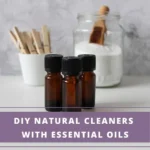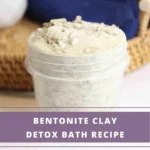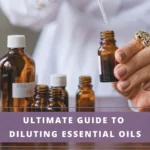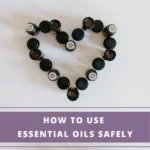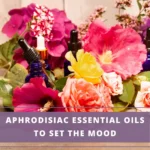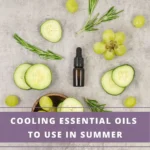As an Amazon Associate I earn from qualifying purchases. See Full Disclosure Here
Have you ever looked at the label of a commercial cleaning product and felt overwhelmed by the list of unpronounceable chemicals?
You’re not alone! Today, more and more people are seeking natural alternatives for their cleaning routines.
One easy and effective way to make this switch is to make your own natural cleaning products with essential oils.
Benefits Of Cleaning With Essential Oils
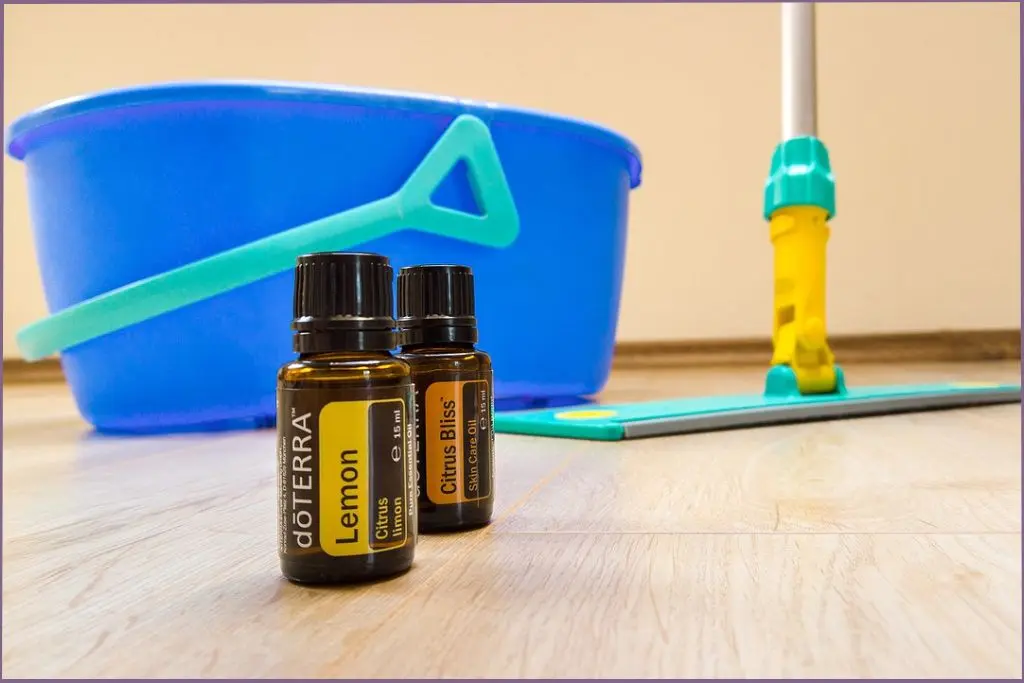
Essential oils are concentrated plant extracts obtained through steam distillation or cold pressing. These potent liquids contain the very essence of the plant, capturing its aroma and powerful properties.
In addition to filling your home with a delightful, natural aroma, these plant extracts also offer several benefits for cleaning.
These are some of the top benefits of cleaning with essential oils:
Nontoxic: Derived from plants, essential oils offer a gentler, nontoxic alternative to harsh chemicals.
Effective: Many essential oils possess natural antibacterial, antifungal, and antiviral properties, making them powerful cleaning agents.
Pleasant Scents: Ditch the artificial fragrances! Essential oils come in a wide range of invigorating and calming scents to leave your home smelling fresh and inviting.
Commercial cleaning products on the other hand contain harsh chemicals that can irritate skin and lungs, especially for those with sensitivities. Traditional cleaners also often contain harmful toxins that can pollute waterways and harm wildlife.
With the proven benefits of essential oils for cleaning, it’s time to ditch the harsh chemicals and embrace homemade natural cleaning products.
Best Essential Oils for Cleaning
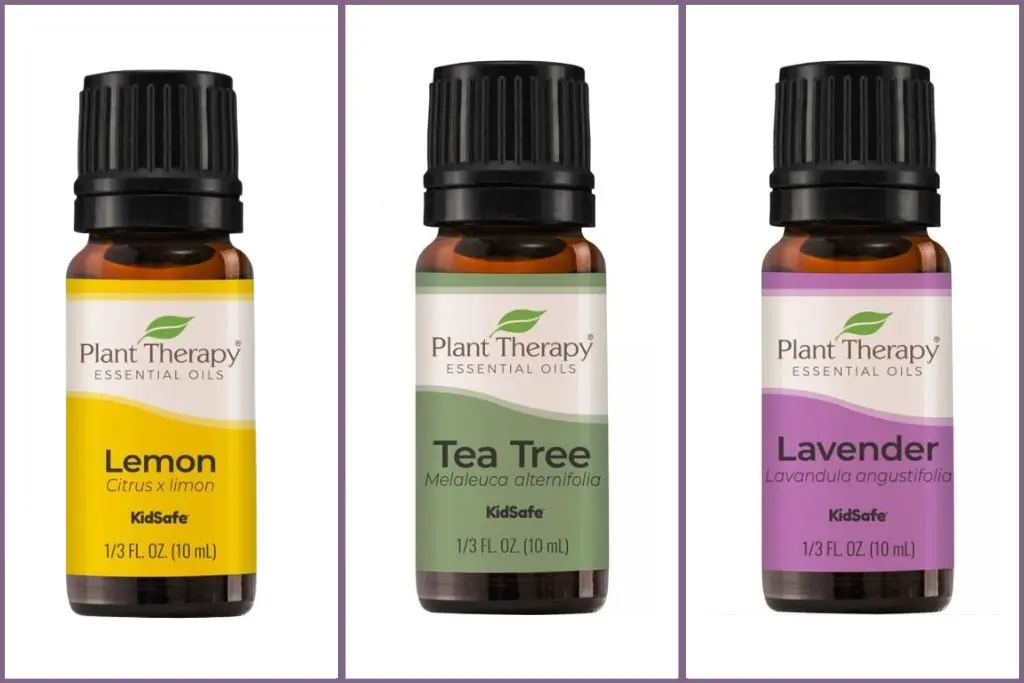
The best essential oils for cleaning are those with the most antiseptic, antibacterial, antifungal, antiviral, and antimicrobial power.
Here’s a look at the best essential oils for cleaning, each offering unique benefits:
Lemon Essential Oil: A champion degreaser and stain remover, lemon essential oil tackles greasy messes on countertops, and stovetops, and even cuts through grime on stainless steel appliances. Its invigorating citrus scent adds a burst of freshness to any space.
Tea Tree Essential Oil: Tea tree is a potent natural disinfectant with antibacterial and antifungal properties. Use it to combat mold and mildew in bathrooms, deodorize laundry, or even tackle stubborn foot odor. Tea tree oil has a strong medicinal scent, so use it sparingly in your homemade cleaning recipes.
Lavender Essential Oil: Beyond its calming aroma, lavender essential oil offers powerful disinfecting properties. Create a calming and clean bathroom environment with a lavender-infused cleaning spray. A few drops on dryer balls can infuse your laundry with a relaxing scent.
Peppermint Essential Oil: This invigorating oil is a natural antibacterial powerhouse. Use it to disinfect surfaces, freshen floors, or even deter pests like ants and spiders. The uplifting scent of peppermint can leave your home feeling energized.
Eucalyptus Essential Oil: A natural antiseptic and deodorizer, eucalyptus oil is ideal for tackling tough odors and disinfecting surfaces. Read – 27 Ways to use eucalyptus essential oil for health and home.
Thyme Essential Oil:: With powerful antibacterial properties, thyme oil is another great option for disinfecting surfaces and tackling mold issues.
Grapefruit Essential Oil: Another essential oil from the citrus aroma family, grapefruit boasts powerful degreasing and stain-removal properties while leaving a fresh, uplifting scent.
With a little research and experimentation, you can find the perfect essential oil combination for all your cleaning needs!
Must-Have Ingredients for DIY Natural Cleaning Recipes
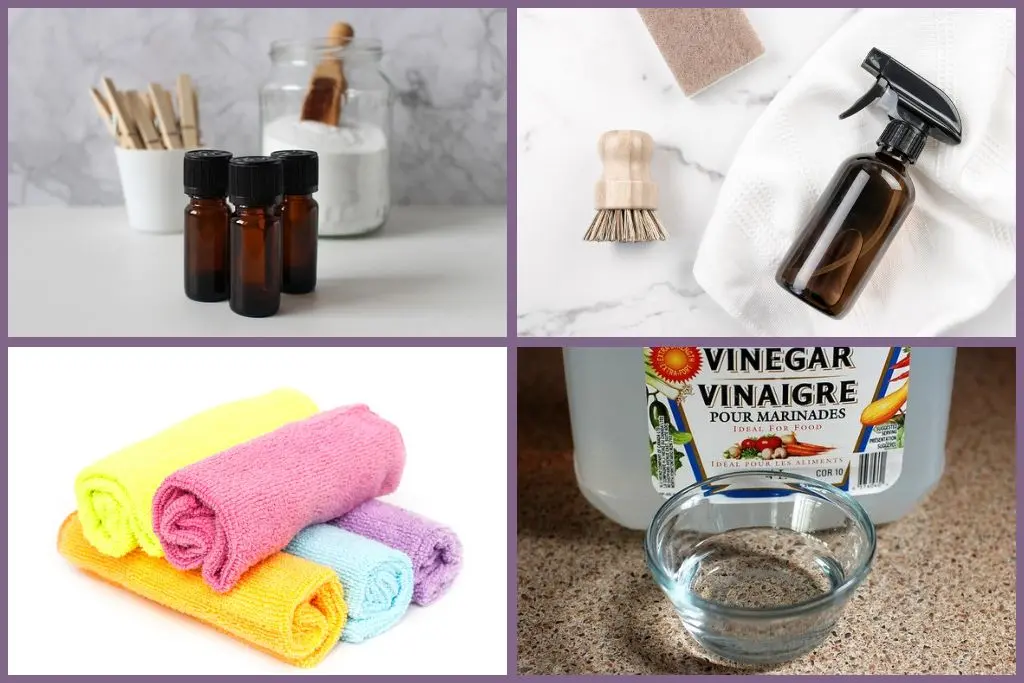
Equipping yourself with a few key natural ingredients can transform your cleaning routine. These are the basic natural cleaning ingredients you’ll need for all the essential oil-cleaning recipes.
Baking Soda (Sodium Bicarbonate): This gentle yet effective powder is a natural deodorizer, stain remover, and mild abrasive. Baking soda can be sprinkled on carpets for odor control, used to scrub greasy messes, and even deodorize your fridge.
White Vinegar: A powerhouse of cleaning versatility, white vinegar cuts through grease, grime, and soap scum. It’s also a natural disinfectant and deodorizer. Caution: Do not mix vinegar with bleach, as it creates harmful fumes.
Castile Soap: Made from vegetable oils, castile soap is a gentle yet effective cleaning agent. It’s perfect for creating your own all-purpose cleaner, hand soap, or DIY dish soap. Look for unscented castile soap for maximum versatility in your cleaning recipes.
Salt: This common kitchen staple has surprising cleaning uses. Salt is a natural abrasive that can help scrub away tough grime on pots and pans. It can also be used to freshen cutting boards or deodorize drains.
Glass Spray Bottles: A set of reusable glass spray bottles in different sizes is a good investment as you can easily repurpose and refill them with your homemade cleaning solutions. While you can use plastic bottles, glass bottles are a more eco-friendly and sustainable choice.
Microfiber Cloths: Ditch the paper towels! Microfiber cloths are reusable, washable, and highly absorbent. They’re perfect for polishing surfaces, cleaning windows, or dusting furniture without leaving streaks or lint.
With these natural ingredients on hand, you’re well on your way to creating a safe and effective cleaning routine for your entire home!
DIY Natural Cleaning Recipes With Essential Oils
Here are some easy-to-make natural cleaning recipes to get you started. Please read the safety guidelines below when cleaning with essential oils.
1. All-Purpose Versatile Cleaner
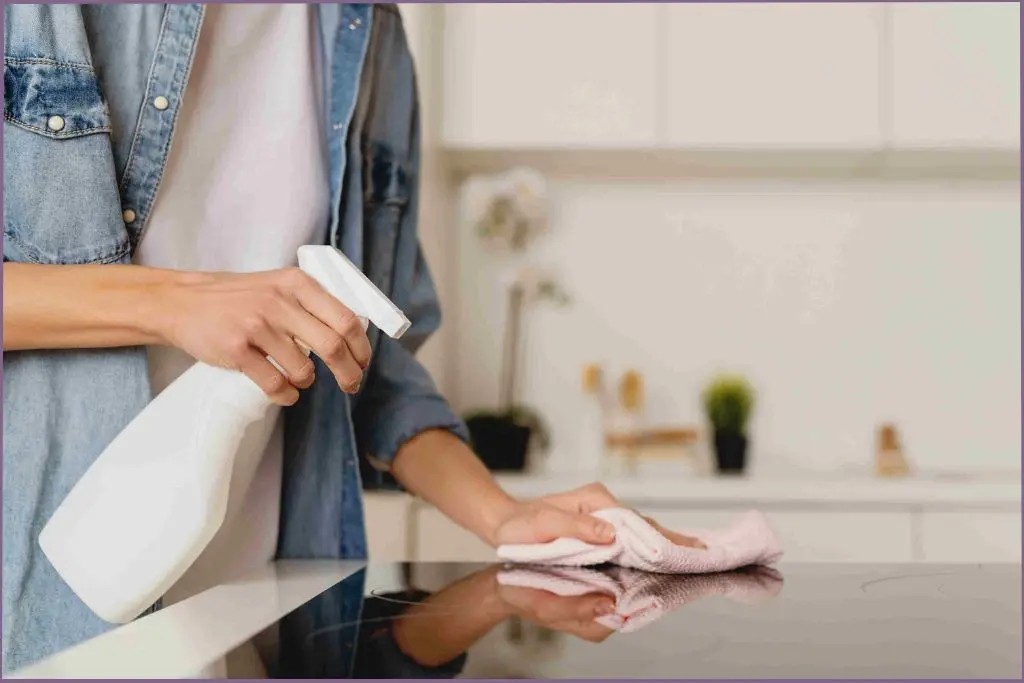
This versatile cleaner tackles everyday messes on countertops, appliances, and floors. It’s safe on most surfaces (always test in a hidden spot first) and leaves a fresh, natural scent.
1 cup white vinegar
2 cups water
15-20 drops of your favorite essential oil (lemon, lavender, or a combination is great!)
8 oz. glass spray bottle
Instructions
Combine vinegar and water in a spray bottle.
Add essential oils and swirl gently to mix. Avoid shaking, which can emulsify the oils with the water.
Label your spray bottle and enjoy your all-purpose cleaning magic!
This all-purpose cleaner is perfect for wiping down surfaces like countertops, sinks, and stovetops.
2. Soft Scrub: Power Up Your Cleaning Naturally
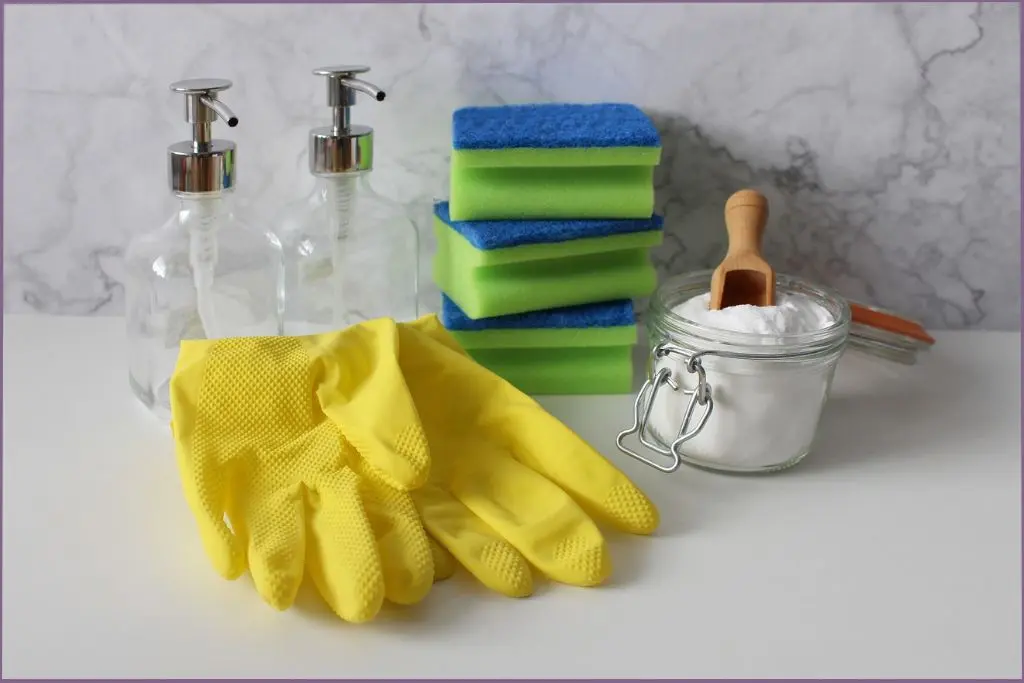
This recipe takes inspiration from the popular Soft Scrub cleaning product but with a natural twist. It harnesses the power of baking soda, a gentle abrasive, and castile soap for cleaning, all boosted with the fresh scent of your favorite essential oil.
1 cup baking soda
1/2 cup liquid, unscented castile soap
1/4 cup water – add more to achieve desired consistency
10-15 drops essential oil – lemon, orange, or lavender are all good options
Instructions
In a large bowl, combine the baking soda and castile soap.
Slowly add the water, a tablespoon at a time, and mix until you achieve a thick paste consistency. You may not need all the water, so adjust as needed.
Add your chosen essential oil and stir gently to incorporate it evenly.
Transfer the mixture to a container with a lid and label it.
How to Use
Apply a generous dollop of the Soft Scrub paste to a damp sponge or cleaning cloth. Scrub the desired surface using a circular motion.
For tougher grime, let the paste sit for a few minutes before scrubbing. Rinse the surface thoroughly with clean water.
This natural Soft Scrub is ideal for cleaning sinks, bathtubs, showers, countertops, and even pots and pans.
Adjust the consistency of the paste based on your needs. A thicker paste works well for scrubbing, while a thinner paste can be used for wiping down surfaces.
This DIY Soft Scrub is best used within a few weeks, so make a fresh batch as needed.
3. Non-Toxic Grime & Grease Remover Recipe For A Sparkling Clean Kitchen
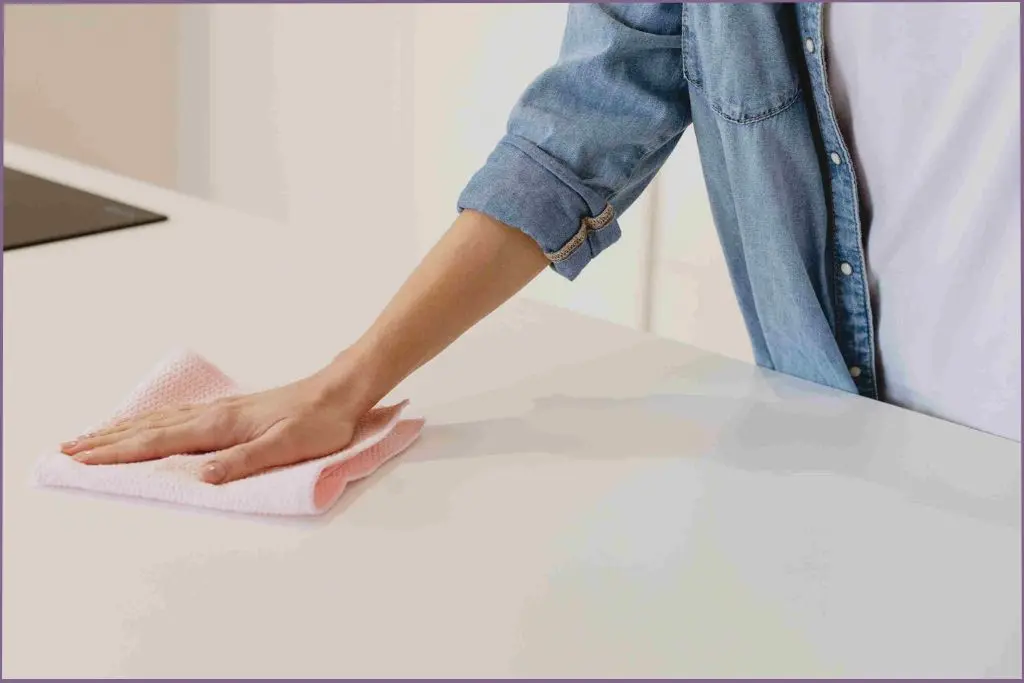
This recipe tackles the toughest kitchen messes with a natural punch! By harnessing the degreasing power of citrus and the cleaning power of castile soap, you can create a powerful, non-toxic grime and grease remover for your kitchen.
1 cup white vinegar
1/4 cup baking soda
4 drops lemon or orange essential oil
8 oz glass spray bottle
Paper towels
How To Use
Fill a clean glass spray bottle with 1 cup of vinegar and set it aside.
In a separate container (an empty spice shaker works well), combine baking soda and a few drops of lemon essential oil. Mix until evenly distributed.
To loosen up grime, generously spray grimy areas and appliances – countertops, stovetops, ovens – with the vinegar solution. Then, sprinkle the lemon essential oil baking soda mixture onto the dampened surface.
Once you’ve covered the area with the baking soda mixture, give it another good spray with the vinegar.
A fizzing reaction might occur, which is normal and helps break down the grime. Let the solution sit for 15 minutes.
After 15 minutes, scrub the area with a brush or sponge.
Grab some paper towels and wipe away the loosened grime. It’s more convenient to use paper towels when dealing with grease and grime as it can be difficult to wash a greasy microfiber cloth.
For particularly stubborn areas, repeat the process with the vinegar spray and baking soda mixture.
4. Disinfectant Spray: Banish Germs the Natural Way
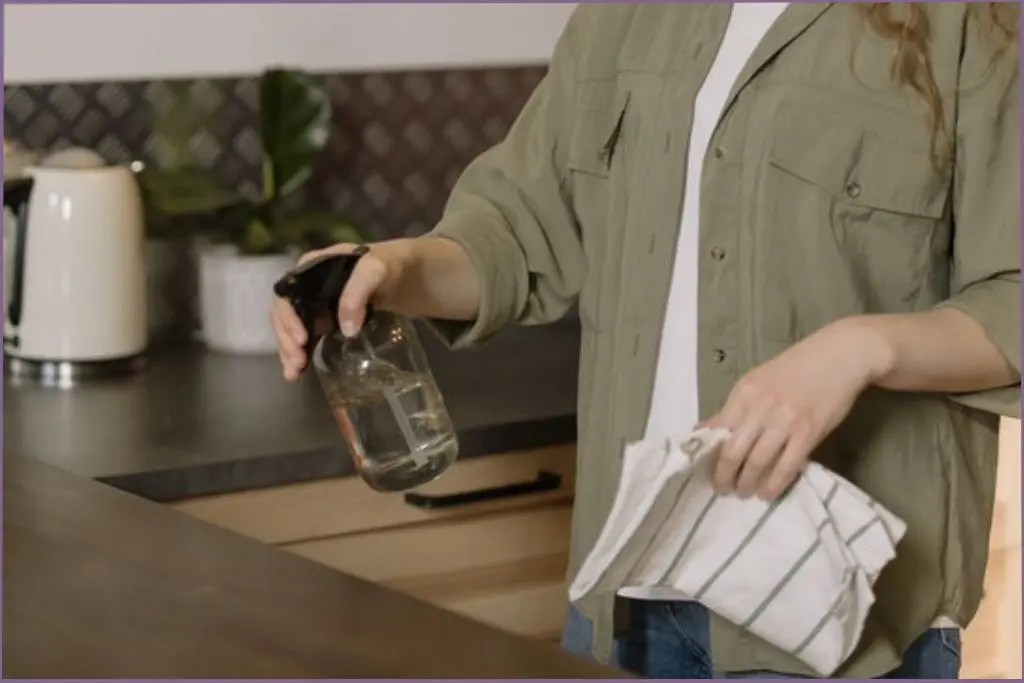
This DIY disinfectant spray harnesses the power of alcohol and essential oils such as tea tree that has natural disinfecting properties, to combat germs and bacteria on surfaces throughout your home. This powerful spray tackles germs and bacteria in kitchens, bathrooms, and doorknobs.
It’s a safe and effective alternative to harsh chemical cleaners, leaving your home clean and smelling fresh.
1 cup rubbing alcohol (isopropyl alcohol at least 70%)
1 cup distilled water
10-15 drops of tea tree oil or lavender oil (both have natural disinfecting properties)
Optional: 1/4 teaspoon liquid unscented castile soap – helps disperse the essential oil
Directions:
Combine rubbing alcohol and water in a spray bottle.
Note 1: Never mix essential oils with undiluted alcohol asit can cause a flammable reaction.
Note 2: Isopropyl alcohol is flammable and can irritate skin and eyes. Ensure proper ventilation when using this recipe and keep it out of reach of children and pets.
Add essential oils and swirl gently to mix.
Label your spray bottle clearly and use with caution in well-ventilated areas. Store in a cool, dark place.
Mix all the ingredients in a bottle and shake well before use.
How To Use
Shake the spray bottle well before each use.
Spray surfaces generously, ensuring they are completely wet.
Let the solution sit for 10 minutes to allow it to work effectively.
Wipe the disinfected surface with a clean microfiber cloth.
5. DIY Floor Cleaner With Pine for a Naturally Fresh Shine
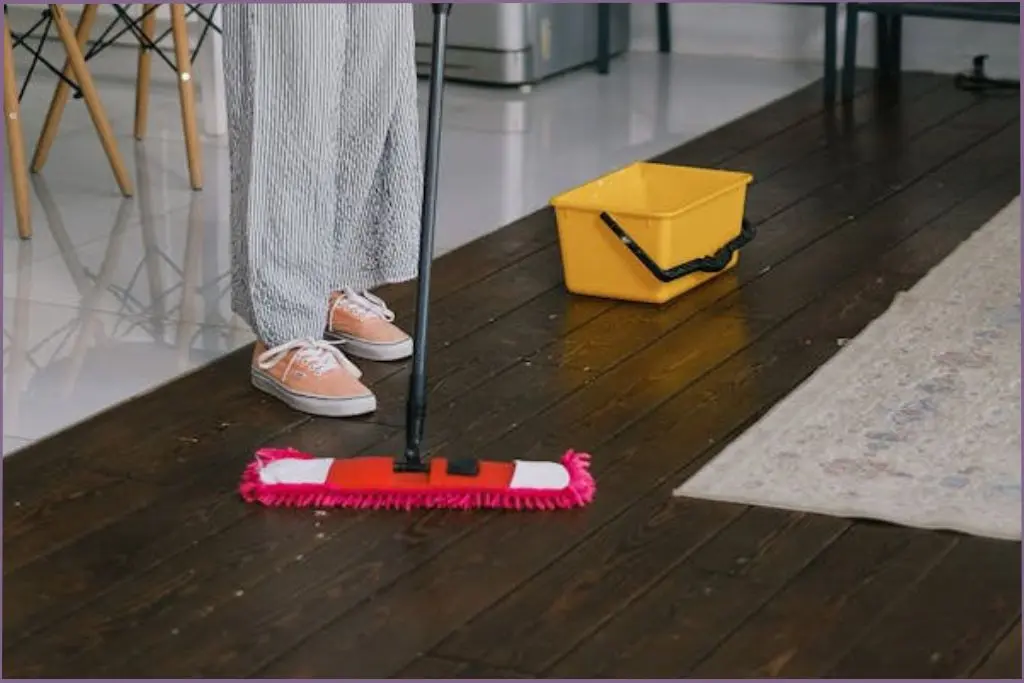
This recipe utilizes the cleaning prowess of castile soap and the refreshing scent of pine essential oil to create a gentle yet effective floor cleaner. Perfect for wood, laminate, and tile floors, this DIY solution keeps your home sparkling clean and smelling like a crisp pine forest.
1 gallon hot water
1/2 cup liquid, unscented castile soap
1/4 cup white vinegar (optional – for extra cleaning power)
20-30 drops pine essential oil
Instructions:
In a large bucket, combine hot water and castile soap. Stir well to dissolve the soap.
If desired, add the white vinegar for extra cleaning power. White vinegar is a natural disinfectant and can help cut through grime.
Add the pine essential oil and stir gently to mix. Avoid shaking vigorously, as this can cause the oil to separate from the water.
Label a large container (a recycled mop bucket works well) with “Pine Floor Cleaner” and store it in a cool, dark place.
How to Use:
Before mopping, ensure your floors are free of loose dirt and debris by sweeping or vacuuming.
Dilute the floor cleaner solution with water in a separate bucket. The dilution ratio will depend on your floor type:
Wood floors: Use a 1:10 dilution – 1 cup cleaner to 10 cups water.
Laminate and tile floors: Use a 1:20 dilution – 1 cup cleaner to 20 cups water.
Dampen your mop in the diluted solution and wring it out thoroughly. The mop should be damp, not soaking wet.
Mop your floors as usual, following the grain of the wood (if applicable). Allow the floor to air dry completely.
Adjust the amount of pine essential oil based on your preference. Start with 20 drops and add more for a stronger scent.
6. DIY Daily Shower Spray with Peppermint
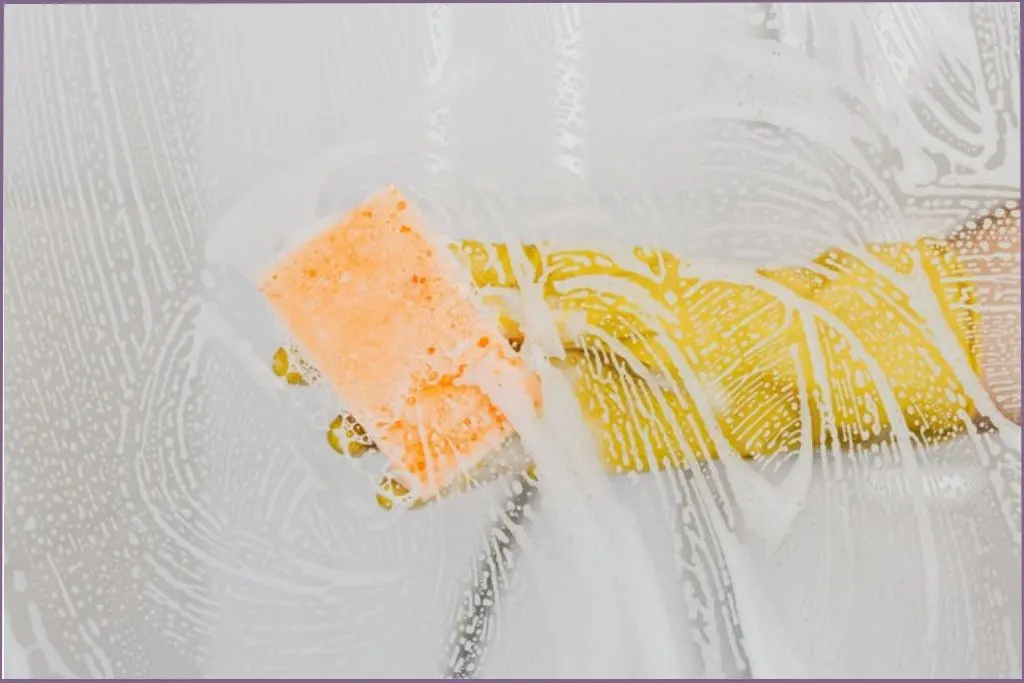
This essential oil cleaning recipe creates a refreshing and invigorating daily shower spray that keeps your shower smelling clean and promotes a spa-like experience.
2 cups distilled water
1/2 cup witch hazel – acts as a natural disinfectant and helps disperse the essential oil
20 drops peppermint essential oil
8 oz glass spray bottle
Instructions:
Add all ingredients in a spray bottle and swirl gently to mix. Avoid shaking vigorously, as this can cause the oil to separate from the water.
Adjust the amount of peppermint essential oil based on your preference. Start with 15 drops and add more if desired.
For an extra refreshing touch, add a few drops of lavender essential oil to the mix.
Label your spray bottle clearly as “Daily Shower Spray” and store it in a cool, dark place.
How to Use:
After showering, mist the shower walls, floor, and curtain with your homemade shower spray and leave it. No need to rinse.
The peppermint essential oil will leave a fresh, invigorating scent while the witch hazel helps prevent mold and mildew growth.
This daily shower spray is best used within a few weeks, so make a fresh batch as needed.
7. DIY Natural Toilet Cleaner with Citrus Power
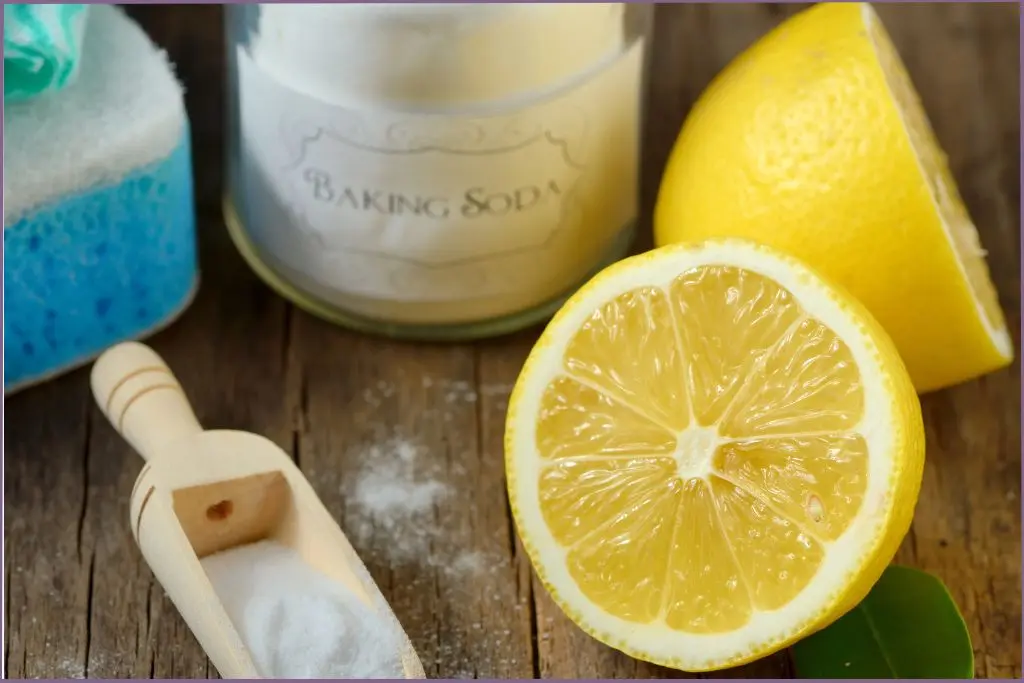
The Banish Bowl Blues essential oil cleaning recipe tackles toilet bowl grime naturally, leaving your bathroom smelling fresh and clean. The power of citrus essential oil cuts through tough stains, while vinegar disinfects and deodorizes.
1 cup white vinegar
1 cup baking soda
¼ cup salt
10 drops lemon essential oil (or grapefruit essential oil)
10 drops tea tree essential oil
8 oz Glass spray bottle
Container with shaker lid (large, recycled spice shaker works great)
Instructions:
In a spray bottle, combine white vinegar and water.
Add the baking soda and swirl gently to dissolve (it may fizz a bit).
Add the lemon or grapefruit essential oil and mix well.
How To Use
Fill a clean glass spray bottle with white vinegar and set it aside. In a separate container (an empty spice shaker works well), combine baking soda, salt, and a few drops of tea tree essential oil. Mix well to distribute the tea tree oil evenly.
Loosen up the grime by giving the toilet bowl a good spray with the vinegar solution, focusing under the rim and on any stained areas.
Now comes the magic! Sprinkle the baking soda, salt, and tea tree oil mixture generously into the toilet bowl. You might see a fizzing reaction – that’s the baking soda and vinegar working together to break down grime. Add a little more vinegar if the fizzing seems weak.
Let the solution sit for 15 minutes. This allows the vinegar and baking soda to work their cleaning magic, while the salt acts as a mild abrasive.
After 15 minutes, grab your toilet brush and scrub the bowl thoroughly. Finish by flushing the toilet to rinse everything away. Repeat the process if needed for stubborn stains.
For stubborn stains: Sprinkle some baking soda directly onto the stain before spraying with the solution.
Let it sit for 15-20 minutes for extra cleaning power. Scrub and flush as usual.
8. Foaming Hand Soap: Pamper Your Hands Naturally
This gentle yet effective hand soap leaves your hands clean and smelling fantastic.
1/2 cup castile soap (liquid, unscented)
1/2 cup water
1 tablespoon carrier oil (like jojoba oil or sweet almond oil)
10-15 drops of your favorite essential oil (lavender, peppermint, or a blend)
Instructions
Combine castile soap, water, and carrier oil in a foaming soap dispenser.
Add essential oils and shake gently to mix.
Enjoy the luxurious lather and clean feeling of your natural hand soap!
9. Oven & Stove Top Cleaner
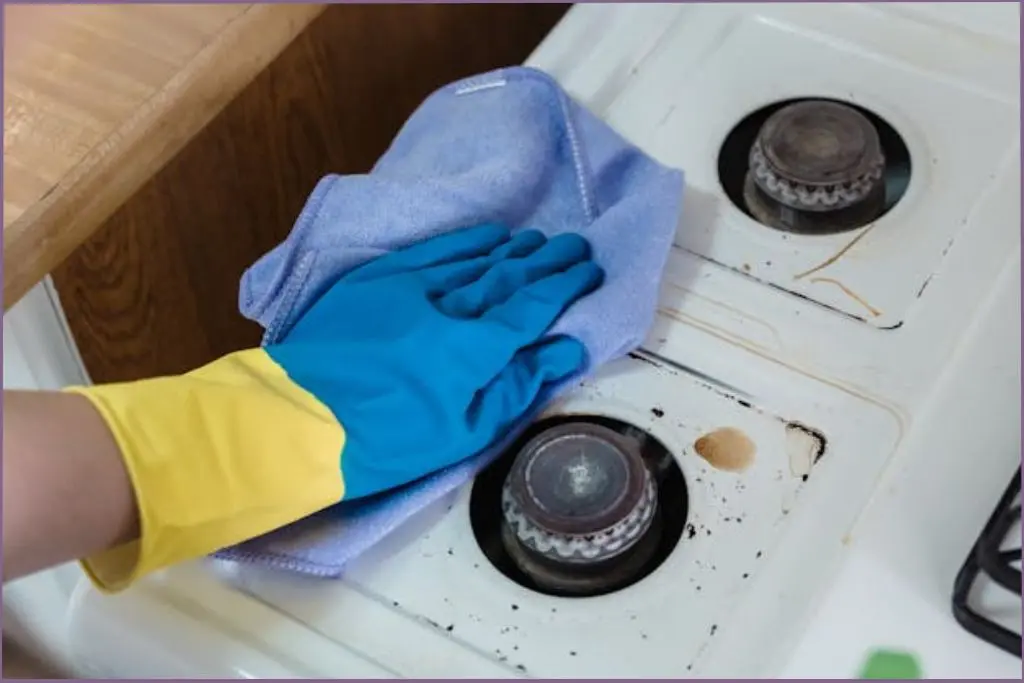
This DIY oven degreaser and stove top cleaner recipe tackles tough baked-on grease and grime in your oven and stove top, leaving it sparkling clean without harsh chemicals.
The power of baking soda combined with the natural cleaning properties of lemon and orange essential oils cuts through grease effectively, while the coarse salt acts as a gentle abrasive for scrubbing.
1 cup baking soda
1/4 cup coarse salt
1/4 cup water
1 tablespoon liquid castile soap (unscented)
10 drops lemon essential oil
10 drops orange essential oil
Instructions
Combine baking soda, salt, and water in a bowl and stir to form a thick paste.
Add the castile soap, lemon essential oil, and orange essential oil, and mix well to incorporate everything.
How To Use
Apply the paste generously to the greasy areas inside your oven, focusing on heavily soiled spots. Important Note: Allow the oven to cool completely before cleaning.
Let the paste sit for at least 30 minutes or overnight for tougher grime.
Using warm water and a sponge or non-abrasive scrub brush, scrub the greasy areas to loosen the baked-on residue.
Rinse the oven thoroughly with clean water and wipe it dry with a microfiber cloth.
Tips:
Wear gloves when cleaning your oven, especially if using hot water.
You can use a spray bottle filled with white vinegar to help neutralize any remaining baking soda residue left over after rinsing.
This DIY oven degreaser is best used fresh. Leftovers can be stored in an airtight container for a short period, but its effectiveness might diminish.
10. Mold and Mildew Fighter Recipe
Mold and mildew can be a stubborn enemy, but don’t despair! This natural cleaning solution utilizes the powerful antifungal properties of tea tree oil to combat these unwelcome guests.
1 cup white vinegar
1 cup water
1 tablespoon baking soda (optional)
20 drops tea tree oil
Instructions
In a spray bottle, combine white vinegar and water.
Add the baking soda (if using) and stir until dissolved. Baking soda helps with scrubbing and deodorizing, but it’s not essential for the anti-mold properties.
Add the tea tree oil and swirl gently to mix. Avoid shaking, as this can cause the oil to emulsify with the water, reducing its effectiveness.
How to Use
Wear gloves and a mask when cleaning mold or mildew, as inhaling spores can be harmful.
Spray the affected area liberally and let it sit for 10-15 minutes. Scrub the mold or mildew with a stiff brush and rinse thoroughly with clean water.
You may need to repeat the process to remove stubborn mold or mildew growth,
Important Note: While this solution can be effective for mild mold and mildew problems, extensive infestations may require professional remediation. Always ensure proper ventilation when using this cleaner.
If you have any concerns about mold or mildew in your home, consult a professional for proper assessment and treatment.
Essential Tips for Safe & Effective Results with DIY Cleaning Recipes
Before you dive headfirst into your essential oil cleaning revolution, here are some key things to keep in mind:
Always test the cleaning solution on an inconspicuous area of the surface first to ensure it doesn’t discolor the surface. Conduct this patch test before using essential oil cleaner on any surface.
Label the bottle clearly so you don’t mistakenly use the wrong cleaner.
Keep your essential oil natural cleaning products in a cool, dark cabinet away from direct sunlight and heat. This will preserve their potency and prevent them from degrading.
Essential oils can be harmful to children and pets. Store them securely and avoid using them in areas where children or pets frequently roam.
Where To Buy Essential Oils
Look for high-quality essential oils from reputable brands that prioritize organic and therapeutic-grade ingredients. From quality to cost, you won’t find a better essential oil brand.
Read my detailed Plant Therapy brand review to know why this is my #1 brand for buying essential oils.
Eco-Friendly Twist: Repurpose Those Spray Bottles!
Instead of buying new spray bottles, consider reusing old ones from store-bought cleaning products. Just give them a thorough cleaning with hot soapy water and white vinegar to remove any residue. Not only is this eco-friendly, but it also saves you money!
Making your own natural cleaning products with essential oils offers a multitude of benefits:
Safer for Your Family and Pets: Ditch the harsh chemicals and create a healthier cleaning environment for everyone in your home.
Effective Cleaning Power: Natural doesn’t have to mean ineffective! Essential oils offer powerful cleaning properties to tackle everyday messes and germs.
Aromatherapy Boost: Fill your home with the uplifting or calming scents of essential oils while you clean.
Eco-Conscious Choice: Reduce your reliance on plastic packaging and harsh chemicals that can harm the environment.
Cost-Effective: By making your own cleaning products, you can save money in the long run compared to buying commercial brands.
So, what are you waiting for? Grab your favorite essential oils and follow the recipes above for a clean, healthy, and naturally fragrant home!
Remember, a little goes a long way with essential oils, so start slow and experiment to find what works best for you.
Related Reads:
Tips for spring cleaning with essential oils
DIY Disinfectant sprays with essential oils
Disclaimer: This information is not intended to serve as medical advice. Please consult your doctor before using any natural medication or if you experience any unusual symptoms. See Full Disclaimer here.


